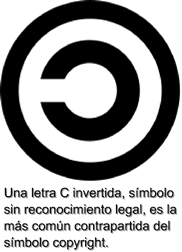
An inverted letter C, not a legally recognized symbol, is the most common counterpart of the copyright symbol.
It seems that the dictatorships invented it but the inverted C is the counterpart of the Copyright symbol. It was created in 1976 and published with a small software to save RAM memory in the then rudimentary computer industry.
Although its origin has nothing to do with human rights, it leads me to draw a parallel with the errors and injustices that still exist in the world and which prevent entire peoples and large social groups, for ethnic, cultural or other reasons, from having the guarantee of a decent life.
Many governments evade the accusations about their negative records on respect for fundamental rights on the grounds of poverty. Others wriggle out of the issue with the simplistic justification of the role of rich countries and the shameful scar of colonialism.
There are also places like Cuba, where governments prevent their citizens — under the guise of an ideology and historically outdated disputes with their American neighbors — from exercising their rights fully.
We are a gagged people of whispers, while most of the world calls out their achievements and demands more and more freedom for themselves and their children. The Cuban totalitarian system bases its strategy of manipulation of human rights on the pillars of the right to life, education, culture and health, while the all other rights are routinely violated, even if all are interdependent and indivisible.
Thus, they have never published the text of the Universal Declaration of Human Rights, issued by the United Nations in 1948. Their cadres and empowered notables, repeat the unsustainable argument that the Cuban government is the best example in terms of respect for these rights, although they are reluctant to ratify and implement the International Covenants and Protocols, which they are legally obliged to honor.
Generally, Cuban authorities tend to stain Human Rights Day, which precedes Christmas, with intransigence and arbitrary arrests harmful to freedom of thought, the conciliatory and fraternal spirit of the festivities, while the alternative political society in Cuba celebrates this significant date with various civic activities.
At present, the Cuban dictatorship has introduced to the part of society that responds to their interests a certain permissibility to public recognition of Human Rights Day on December 10. Gradually the clouds of intolerance are moved by new winds which — manipulatively or not — incorporate new phrases into the rigid vocabulary of the slogans of the adherents of totalitarianism.
This more than fifty-year old model imposed on us forces us to live in a sociopolitical and economic order in which they determine the concepts and categories of rights and decide what we may exercise and enjoy in society.
We Cubans who love liberty, watch with indignation as one part of the human leaders of Cuba re-emphasize their attitude of considering themselves above the rest of us, and fundamentally save and preserve their left, without considering the civil and political rights of the rest of their compatriots.
We continue working with the certainty that the day is every closer when we will eliminate this rod, more punishing than disciplinary, with which the government beats us and prevents our advancing toward the gradual introduction of the exercise of the rights and freedoms of our people, as a preamble to full democracy we Cubans deserve.
December 17 2012
